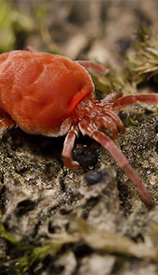Overview
Sarcoptic mange, also known as canine scabies, is caused by the mite Sarcoptes scabiei canis. These microscopic monsters attach themselves to your dog’s skin and, after mating, the female mites burrow beneath the skin. While all dogs may contract sarcoptic mange, younger ones are at greater risk. This nasty little bug is highly contagious and can spread from dog to cat or person.
Symptoms Mange can either be localized or affect specific areas of your dog’s body. Sarcoptic mange is intensely itchy and will make your poor pooch scratch and chew his skin. He will also develop red papules that resemble small pimples. The symptoms from sarcops are thought to be the result of an allergy to the mite itself. If left untreated, chronic skin conditions including lesions, darkening of the skin, patchy hair loss, and thickening and wrinkling of the skin can develop.
Mange can either be localized or affect specific areas of your dog’s body. Sarcoptic mange is intensely itchy and will make your poor pooch scratch and chew his skin. He will also develop red papules that resemble small pimples. The symptoms from sarcops are thought to be the result of an allergy to the mite itself. If left untreated, chronic skin conditions including lesions, darkening of the skin, patchy hair loss, and thickening and wrinkling of the skin can develop.
Diagnosis/Treatment
In order to diagnose your pet, your veterinarian will perform a very thorough physical exam, ask about his behavior, and take skin scrapings of the affected areas. Your veterinarian may recommend other tests specific to your dog’s symptoms and the severity of the infestation.
The treatment for sarcoptic mange varies depending on the level of infection and your dog’s particular situation. It typically includes specialized shampoos or dips, topical preventives for fleas and heartworm, and regular vacuuming and cleaning of your dog’s bedding. In some situations, if a secondary bacterial infection has occurred, additional medications such as antibiotics are prescribed.
Prevention
The best preventive for sarcoptic mange is to keep your four-legged friend away from infected animals! Mites do not survive long in the environment, so direct contact is necessary for infection.
If you have any questions or concerns, you should always visit or call your veterinarian – they are your best resource to ensure the health and well-being of your pets.
| Beware the Bug More about mites |

